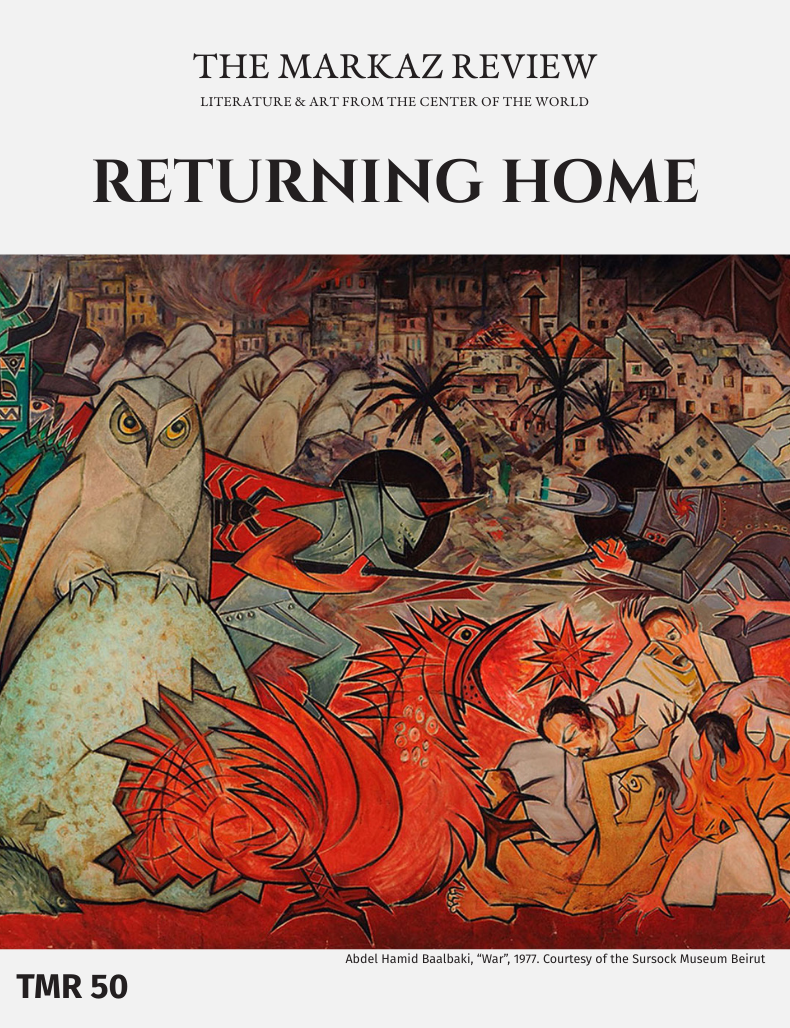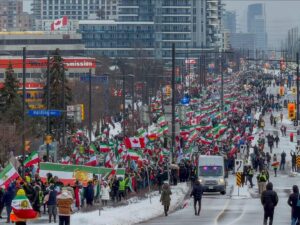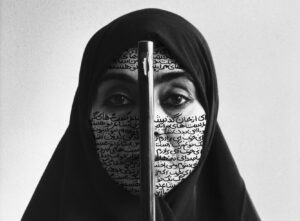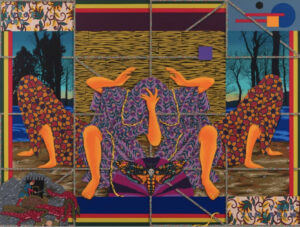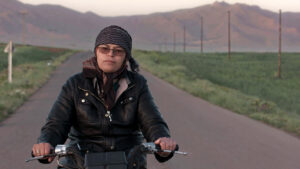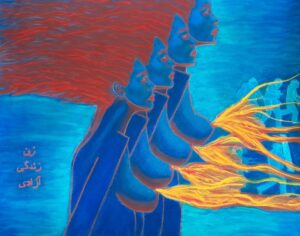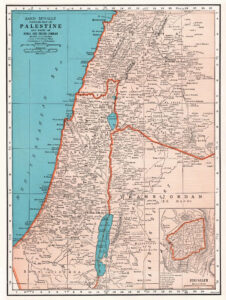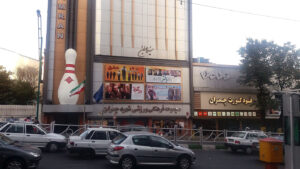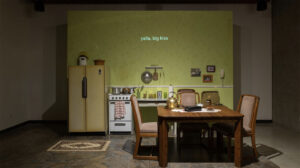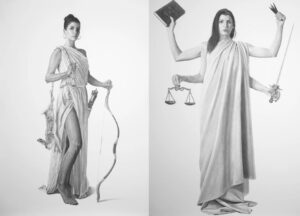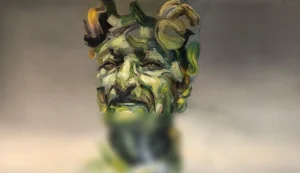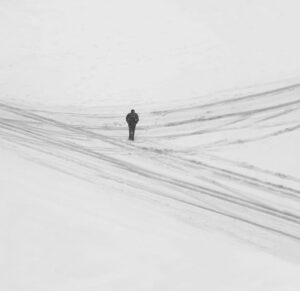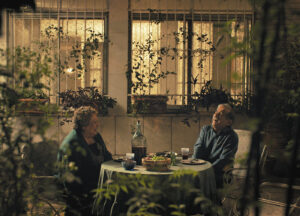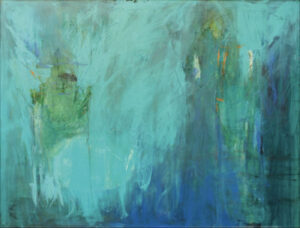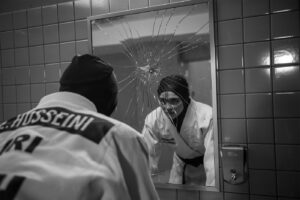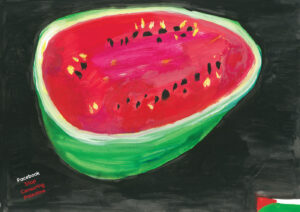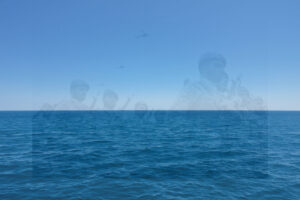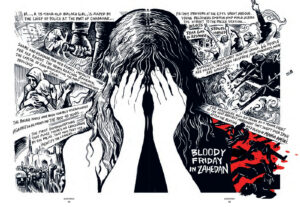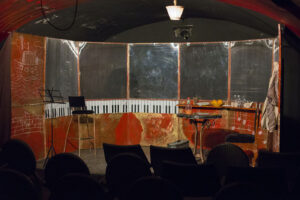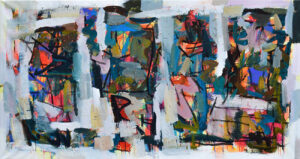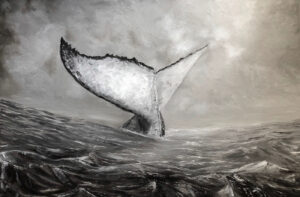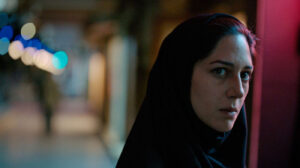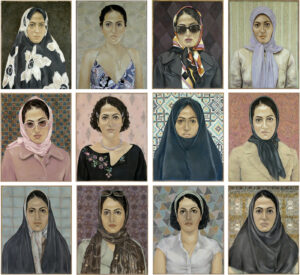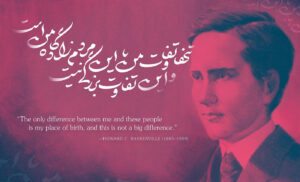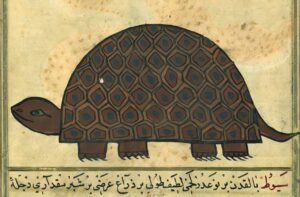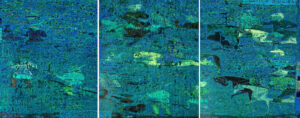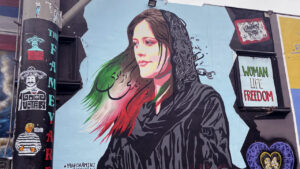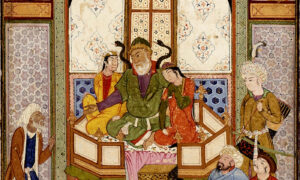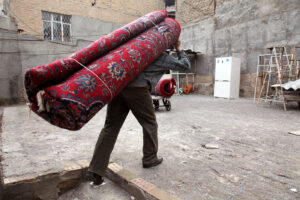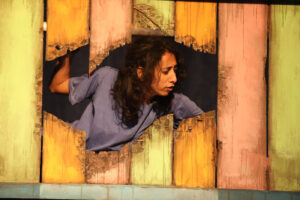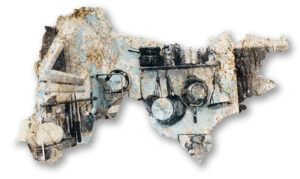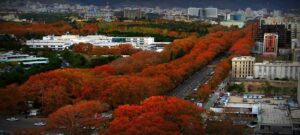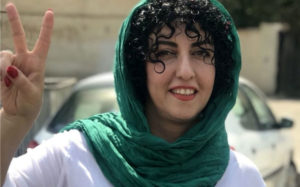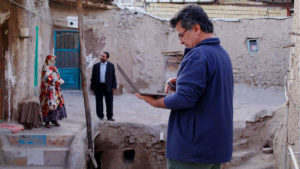Not even escalating tensions between Israel and Iran could stop one wayward Iranian from returning home.
I tilted my head, waiting for the medication prescribed by my doctor to trickle down into my ear. But before it did, my landlady started shouting, “Raha! Venez voir ça! L’Iran a attaqué Israël!”
Two weeks had passed since I’d bought my ticket back to Iran. Since then, the news had been flooded with images of missiles and drones launched by Iran in retaliation for an Israeli attack. However, my decision had been made. Fourteen years in broom closet-size rooms, putting up with eccentric landlords, and unending, repetitive job interviews leading nowhere had exhausted me.
Also, I was worried about my father; his Alzheimer’s had worsened. From our frequent phone conversations I could tell that soon, even speaking to me would become difficult for him. I remembered one day, years ago, when his illness had already started taking its toll. I found him wandering around the house, searching for something. “What are you looking for?” I asked.
“Myself,” he replied.
Maybe that was another reason I was going back to my country — to find myself.
Usually flights from Paris to Iran arrived around midnight, but with a change in schedule, due to the escalating tensions between Iran and Israel, I was flying over my hometown of Isfahan at midday. Outside the window, the bright sunlight illuminated the dry, cracked land surrounding the city like the wrinkles on an old man’s face. Isfahan had once been considered the fairest of Iranian cities because of its gardens and farms. Yet, despite the arid dustiness, it still moved me; I felt a mixture of love, fear, and hope.
My brother picked me up from the airport. It was late September. Even from a distance, Isfahan looked calm and familiar, with its blue domes that came to me in my dreams. The Zayandeh Rood river, once a symbol of the city’s gracious charm, was now a desiccated riverbed that wound its way through the city’s withered heart. People walked through the streets, heads down, seemingly lost in thought. My hand outside of the open car window caressed the warm breeze. It smelt like home, in spite of the sadness.
My mother had rented out the house where I had spent my childhood and moved to a safer neighborhood. When she opened the door, I noticed that she had shrunk, her face more worn since the last time I saw her a year ago when I’d visited Iran for two weeks.
My father was sitting in his usual chair. He showed no reaction to my arrival.
“Salam,” I greeted him.
Momentarily he lifted his head, and responded warmly, as was his usual habit. Then just as quickly, he lowered his head again.
My first week back was mostly spent visiting my brothers and sisters and, of course, fixing my teeth.
Our family dentist isn’t known for being the best in his field, but his warmth and personality have made him incredibly popular. His clinic is always packed. He works double shifts, assisted by young, cheerful women who share an easy camaraderie with him. One said, “I’m getting a lip piercing today.” The doctor glanced at her, and then looked down at me in the dentist’s chair. With a grin he asked, “Weren’t you scared to come back to Iran when they’re sending water heaters disguised as missiles toward Israel?”
With his implements in my mouth, I could only nod — a gesture that could mean both yes and no.
I had already told him that I planned to move back to Tehran in a month, so he needed to finish my dental work before I left. He charged me five million tomans ($50) for a crown.
Afterwards my mother told me, “Considering how quickly he gave you an appointment, that’s a good price.”
“Weren’t you scared to come back to Iran when they’re sending water heaters disguised as missiles toward Israel?”
Six years ago, I had returned to Iran for a year and a half, and worked at an advertising agency, but the country’s economy was collapsing. The dollar exchange rate had jumped from 2,000 tomans to 12,000 tomans. Now on coming back for good, the economy was in free fall. By late 2024, it was 56,000 tomans to one dollar. Since then, it has skyrocketed to 99,000.
I had always wanted to teach at a university, but my bachelor’s degree wasn’t enough for Iran’s University of Art. So, I applied to a master’s program at the Paris University of the Arts, got accepted, and left Iran again. Before I finished my studies, COVID hit, and two years slipped by. By the time I realized that five years had passed, I figured it was time to try to realize my dream of teaching art in Iran.
This time, I had a master’s degree — with distinction. All I needed to do was talk to the head of the art department at the university. In Tehran, a meeting was arranged and I met with two departmental heads at my friend’s café. They were enthusiastic about my degree and the possibility of me teaching. We then moved onto the topic of payment. I was stunned. University lecturers earn 35,000 tomans or 35 cents an hour — not even enough to cover transportation costs. Essentially, I’d be working for free. And the strangest part? Many people were already doing just that.
I turned to one of the professors, and said, “If you ask a handyman to change a light bulb in your house, he’ll charge you 500,000 ($5) for an hour’s work. But a university professor is 35,000?”
He shrugged, “That’s the standard rate for freelance lecturers in all the universities across the country.”
By then, night had fallen, and the three of us noticed glowing objects moving across the sky.
A loud voice in the café quipped, “Looks like Iran is launching more missiles toward Israel.”
But no one seemed too concerned. A quick glance, a passing comment, and then everyone went back to drinking their tea.
The next morning, I walked through my old neighborhood in Tehran. It was alive, full of middle-class families. It had been one of the most politically active areas during protests against the government. I decided to reach out to old friends. Some had distanced themselves over the years, assuming I was living comfortably in France, far removed from their struggles. But most were happy to meet up again.
Two of them ran an advertising agency, and one told me that he made $1,500 to $2,000 per month — a great income for Iran. He had also invested in real estate and was making money from his rental properties. He was obviously living comfortably and could even afford to travel abroad.
On the opposite end of the spectrum was Zeina, a painter I’ve known for 30 years. She had never managed to afford even a small apartment, and she blamed her husband for their economic situation. Six years ago when I was back in the country, I’d sensed that her feelings for him had faded, but then she didn’t have the courage to leave him. This time, when we met, she proudly showed me the stamp in her ID, and announced, “Two weeks ago, I got divorced.”
To secure it, she had waived her mehrieh, a cash payment to the wife in religious marriages, which made it easier for her husband to agree to a legal separation. However, due to the soaring cost of rent, the two of them were still living under the same roof.
Even she was unable to answer my question, “How does someone make a living in the arts?”
Two universities invited me to speak about my experiences abroad. The atmosphere on campus was nothing like it was when I was a student. Twenty years ago, young men and women had separate staircases. Now, I saw women attending classes without their mandatory hijabs, freely socializing with their male classmates.
After my lecture I received an invitation from a department head to teach art history there. But the pay was the same — 35,000 tomans an hour.
Interestingly, what struck me about this department head was that despite his religious background, he was openly against the government. “If a student wants to create art on campus,” he told me, “we have to submit an official request.” He also said that during the Woman, Life, Freedom protests, many of his students had been beaten up by the security forces.
According to him, permanent faculty members on the university’s payroll earned between 30 to 40 million tomans ($300 to $400) per month, which considering Iran’s high living costs wasn’t a living wage. When I asked him if there was any possibility of getting a permanent position at the university, he sighed before admitting, “I’ve been teaching here for 20 years, and I’m still on a temporary contract.” Every year he has to sign a new contract.
Maybe I was going back to Iran to find myself. 14 years of tiny rooms, eccentric landlords, and unending job interviews had exhausted me.
In Iran, I had only a couple of chances at securing stable employment and both times I failed the religious screening because I answered questions honestly. These hiring committees are often run by people with Taliban-like mindsets. I still remember my father’s advice from back then: “Forget about getting hired — find another career for yourself.” So, I did. I jumped from job to job, eventually found work in advertising as a graphic designer.
Back in my university days, my old college flame, Laila, would call my dorm once a week, which led to my expulsion from student housing. Years later, we both failed the employment screening interviews. When we met up recently after 30 years, she told me she had started looking for a job again and shared her experiences.
“This time, the process felt different,” she explained, “Back then, I was young and naïve — I didn’t understand the system. Even though I wore a long manteau coat, a headscarf maghna” — a formal cover with a simple design that fully covers the head and neck mostly worn by women who work in government institutions — “and no makeup, they treated me horribly. But this time, I realized that the people handling the employment screenings are stuck in their own little world. They give you forms full of religious and ideological questions, and you have to answer them in a way that doesn’t raise suspicions.”
She continued, “My sister who has been through countless job interviews coached me on what to say. I lied about almost everything — I wrote that I don’t have an Instagram account; I don’t own a passport, and so on. The most surprising part was that woman in charge of my interview smiled warmly as she took my papers and said, ‘I’m so happy to have met you.’
Laila shook her head and added, “I was puzzled until I realized why — because I was wearing a full headscarf maghna, covering all my hair. It’s funny … 30 years ago, we were afraid. I remember all my classmates wore chadors to job interviews. Back then my simple headscarf wasn’t considered a ‘proper hijab.’ And now? The other professors being interviewed weren’t taking mandatory hijab seriously. Many of them had bold makeup. One even wore ripped jeans and bright red lipstick! Compared to them, I looked modest and old-fashioned — so, of course, the recruiter treated me well.”
Walking with Laila through Tehran, it was impossible not to notice that most young women no longer bothered with headscarves. Just a few years ago, they were prohibited from cycling, and now some of them speed through the city streets, with the wind in their hair.
Autumn is the season of art in the city, and the galleries opened new exhibitions one right after the other. I had gone with another friend to northern Tehran to see an exhibition. On the way, in a taxi, I could see how the city had changed. New highways had been built yet the traffic was as suffocating as ever. A trip that should have taken 30 minutes dragged on for hours. The traffic app showed a sea of red lines, as the veins of the metropolis throbbed with congestion.
As we waited in the traffic, my friend and I talked about the US elections and our concerns over the possibility of Trump’s re-election. Suddenly, the taxi driver interrupted our conversation. “Don’t worry, sir!” he said, “Things can’t possibly get worse than this. Maybe Trump is actually the Mahdi himself, here to save the world from misery!”
Making jokes about religious figures in Iran can be a risky business, but Iranians have always found humor in even the darkest situations. On our way to the exhibition, I was struck by the towering shopping malls that lined the streets — gleaming glass facades, symbols of wealth and modernity. Despite sanctions and inflation, these massive buildings continued to rise.
Later out of curiosity, I visited a mall and took the escalator to the cinemas and cafés. At the entrance to a theatre, young men and women stood in line, waiting for a performance to start. I approached a woman working at the door and asked if anyone could attend.
“No,” she replied. “This is a private theater performance.”
What caught my attention wasn’t just the exclusivity of the event — it was the audience itself. Not only was every single woman in line unveiled, some wore crop tops that revealed bare midriffs. In a country where women had been forced to cover their hair for decades, here they dressed as they pleased, defying the official religious rules meant to control them.
That evening, I met up with another old friend, and he told me about his 17-year-old son, who had been arrested during the Woman, Life, Freedom protests. The security forces had hacked into his son’s phone and sent messages to the boy’s friends to lure them into a trap. Everyone was arrested. After days of frantic searching, my friend finally discovered where his son was being held.
During the trial, the judge told him that his son had a serious case against him and not only for protesting, but because the boy’s phone was filled with anti-government slogans mocking Islam and Iran’s Supreme Leader. For three weeks, my friend daily visited the courts, desperately searching for a way to save his son from a lengthy prison sentence.
Eventually, with the right connections and plenty of pleading, he found an officer willing to erase the data from his son’s phone and return it to him. This is what saved him.
In the negotiations with the boy’s father, the officer also revealed something chilling. “During the protests,” he told my friend, “our forces walk among the crowds wearing special wristwatches with hidden cameras, recording everything. That’s how we identify and arrest people later.”
The next day in Enqhelab Square, the streets were eerily empty, most of the shops closed. I stopped by a newspaper stand and asked the vendor why everything was shut. “Because of air pollution!” he replied.
The pollution was intense. I could feel a burning sensation in my lungs. Every two weeks Tehran shut down because of the hazardous air quality. Even restrictions like the traffic control plan had failed to make a difference. Power outages too occurred nearly every other day, and schools, banks, and government offices were closed. The official reasons were either energy shortages or government-imposed shutdowns to save electricity. This hadn’t been the case six years ago.
Making jokes about religious figures in Iran can be a risky business, but Iranians have always found humor in even the darkest situations.
That night my brother called from Isfahan to tell me that my father had fallen ill during the night and had been taken to the hospital. I rushed back as quickly as I could, and found my mother, distressed, standing by his bed. She said the doctor had diagnosed him with a severe bloodstream infection and that he needed to be transferred to the ICU. But no beds were available. If we moved him to another hospital, the bed he currently occupied would be lost.
I told my family I would stay with him that night and that they should go home and return in shifts the next day. When I asked a nurse if there was any possibility of transferring my father to the ICU, she pointed to another patient in my father’s ward and said, “That man has been waiting for days, and there’s still no free bed. If we had one, he would have gone first.”
By afternoon the next day, my siblings arrived. We decided I should go home to rest and return later that night. In the evening, my mother and brother changed my father’s diaper while I emptied his urine bag in the bathroom.
A half hour later I was alone by his bedside. I stared at his face and hands. His muscles had wasted away, leaving only skin and bones. He was on oxygen, his vitals monitored on a screen.
Suddenly, shouting erupted from the main hall. The patient who had been scheduled for an ICU bed before my father and transferred there was being returned to the ward. His furious son was yelling, “This man is a war veteran! He was injured in a chemical attack! And this is how you treat him?” He and his brother had traveled from a nearby town and had been waiting for four days. They took turns sleeping in their car.
The hospital staff wheeled this man’s bed next to my father’s. Waves of exhaustion swept over me. Earlier in the day I had gone home to rest but was unable to sleep. Around 1 a.m., my father suddenly began to tremble violently. His teeth clenched, his eyes rolled back. I called to him, but he didn’t respond.
The nurses’ station in the ward was empty. I ran into the main hall. No one was there. I shouted for someone. Finally, a nurse emerged from a room. Desperate, I told her my father was having a seizure. We ran back together. When she saw him, she immediately went for help. Other nurses returned with her. They rolled my father onto his side and injected him with medication. Slowly, his convulsions eased, his breathing heavy and ragged.
One nurse said, “His lungs are full of fluid.” They inserted a suction tube into his mouth, and I could hear the sound of liquid being drawn out. Finally a doctor arrived and examined him.
I asked the nurse what had caused my father’s seizure, and she said it might have been a reaction to the antibiotics they were giving him for the infection. She replaced the oxygen tubes in his nose with a plastic mask. The nurses turned off the lights and left. The relatives of other patients, who had been disturbed by all the commotion, dozed off once again in their chairs.
I remained awake and watchful, fearful that my father might have another seizure. He kept pulling his blanket off, and I repeatedly covered him up. He also kept removing his oxygen mask, which I continually adjusted. We went back and forth like this for the next two hours until he suddenly had another violent seizure.
I ran back to the main hall to get a nurse. She came back with me, and added a sedative into my father’s IV. He finally fell into a deep sleep.
At 6 a.m., the cleaning staff arrived to mop the floors. A nurse walked through the ward and straightened the patients’ blankets. “The morning shift will be here soon,” she said to no one in particular, “and everything has to look neat and clean.”
I was extremely tired when my mother and brother arrived mid-morning. In passing my brother said, “On my way here I ran into a doctor I know. I think he’s in charge of the ICU.”
It was an opportunity we dared not miss for my father’s sake. “Please, if you can, ask him to transfer Dad to the ICU. He’s been paying insurance for years and has every type. If we don’t use it now, when will we? Use the connection, please ask,” I urged. As I left the hospital, I wondered for how long would this horrible situation go on?
I arrived back at the hospital that evening. Fortuitously my brother called to say he had spoken with the doctor and that the hospital was going to transfer Dad to the ICU. After my mother and one of my brothers arrived the next morning, two nurses started moving my father’s bed toward the elevator. When we tried to go with him, they stopped us and explained: “Only one person can accompany us, and visiting days are limited to two days a week, with only two people allowed in at a time.”
Since I had spent the night with Dad, I told my mother and brother to go ahead while I waited outside. When they returned from the ICU, my brother said, “He’s breathing 50 percent with a machine, and his blood pressure is very low.”
On the days when visiting hours weren’t allowed, we called in to check on him. The next time any of us were allowed to visit was on Tuesday, and my mother, another of my brothers, and I went to hospital. Again I let my mother and brother go into the ICU. However, I asked the security guard if I could see my father for just a few seconds. He said it was impossible since only two family members were allowed in.
I had to wait until Sunday. On Friday, when we called the hospital, the nurse said, “Your father is almost better, he opened his eyes, and should be discharged soon.” Our happiness was tinged with concern: considering his condition how were we going to take care of him once he was discharged? My brother called the doctor who was familiar with my father’s case, and he reassured my brother that it wasn’t yet time for Dad to be discharged; we shouldn’t worry.
Sunday came, and to enter the ICU, I changed into protective attire. The unit was full of beds. A nurse showed me my father’s. I called out to him, but he was unable to turn his head. So I moved to the bed’s other side so he could see me. I greeted him, “How are you?”
His eyes filled with tears and panic. It was so hard to see him in so much pain. I felt as though he was hanging over a cliff, waiting for the moment he would let go and fall into an abyss. This was perhaps the saddest moment of my life.
The hospital called us the next Sunday morning and told us to bring the necessary papers. It was a sign: this visit was to be our final goodbye. Dad was now completely dependent on a machine to breathe, and his heart rate had dropped significantly.
Around 8 p.m. that evening, we received the call that he had passed away. We had to come next morning and pick up his body. The hospital where I had been born was the very place my father had died.
That night, we decided to bury him next to his father, in a plot our family has had permission to use for the past 30 years. The cost of buying a new one was exorbitant.
During the burial ceremony, I realized that many people buy a grave in a cemetery before they die. Graves have become an investment because land, for the living and the dead in Iran, has become increasingly expensive over time. A friend told me that he needed an eye for his mother, and was told that a cemetery worker, who washes bodies before burial, sold eyes of the recently deceased. After several visits, he managed to obtain an eye from a corpse for his mother.




